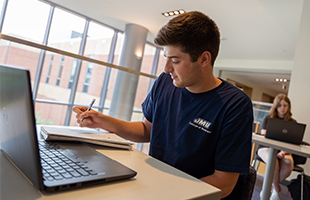Apprentice researchers embark on voyages of discovery
News
SUMMARY: Business students learn basic techniques from faculty mentors.
When Andre Neveu, Ph.D., joined the economics faculty at JMU in 2009, one of the first jobs he tackled was serving as the faculty fellow for the Honors program, which was then undergoing transformation into the Honors College.
Neveu observed that Integrated Science and Technology students across campus were able to participate directly in the research conducted by ISAT faculty, and thought the same opportunity should be afforded to business majors.
It wasn’t an idea to which Neveu had ever been exposed during his own college years at the University of Rochester in the 1990s. When it presented itself to him after his arrival at JMU, his original thought was to deliver the content by way of a course titled “Research Principles in Business.” He soon learned, however, that no natural home existed for such an offering within JMU’s curriculum-and-instruction parameters.
Undeterred, Neveu eventually persuaded college administrators to allocate differential tuition dollars for the establishment of a pilot program he proposed to call “Research Experience for Undergraduates.” The first eight students signed up for REU during the summer of 2015 and each was hired by a different faculty member.
Since then, the program has grown to the point that it consistently employs some two-dozen research assistants per semester. Nearly 300 have taken part in REU since its inception, with most coming from within the College of Business. To date, more than 80 faculty members have taken on RAs to help further their research projects.
Zach McDonough, a double major in finance and economics, is employed this semester as Andre Neveu’s research assistant.
The primary challenge RAs face is that of simply learning how to conduct research. It begins with the formulation of a good research question. She or he may propose a question that, while intriguing, does not lend itself to being investigated — either for lack of the necessary data or because the answer to the question is fundamentally unknowable.
Fledgling RAs may also fail to appreciate how long it can take to complete a project. “Very rarely do these students work only one semester,” says Neveu. “A lot of them continue to work with the same professors semester after semester, and may work through the summer as well.”
The work may consist of data-gathering, or faculty researchers may delegate to RAs the writing of computer code, or the use of software with which they themselves are not familiar.
“I have had first-year freshmen get hired by faculty members who are looking for somebody they can have under their wing for four years,” says Neveu. “I do ask students to re-apply each semester,” he says, “in order to formally extend the relationship.”
An REU project can serve as a platform from which to embark on an Honors thesis or an independent study project.
“It also gives students something solid to talk about in job interviews,” says Neveu. “Alumni often comment about how great it was that they had something to help them stand out.”
He adds that there is value in RAs working as members of a team, with a boss and a hierarchical set of relationships.
“All of these things are good practical benefits for someone who’s looking for a job following graduation.”
